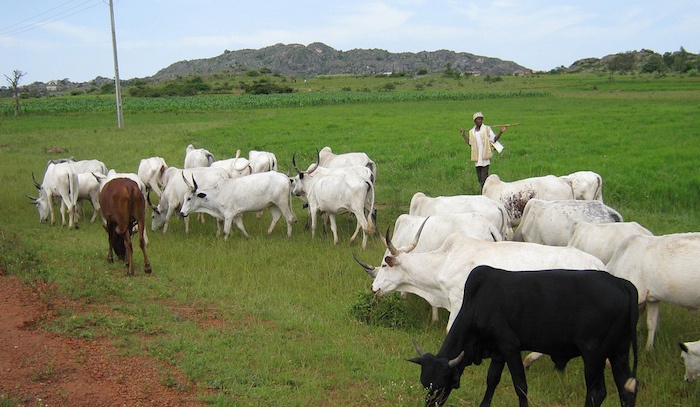The recent comment by President Muhammadu Buhari on the existence of a grazing reserve gazette in the country and his directive to the Hon. Attorney General of the Federation, Abubakar Malami, SAN to dig out same for possible implementation has expectedly been generating heated reactions mostly negative from Nigerians, the most recent coming from the red chamber spokesman, Senator Ajibola Bashiru.
Senator Bashiru, a lawyer by calling, contends that there is currently no grazing route law at the federal level or in the Laws of the Federation for Mr. President to implement or for Abubakar Malami, SAN, to dig out for implementation.
Senator Bashiru is right. The only grazing law that existed in Nigeria was the Northern Nigerian Grazing Law of 1964/1965 that was enacted by the then Northern Nigeria Legislative Assembly and therefore with the collapse of regionalism or the fall of the First Republic and the coming into effect of the Land Use Act on the 29th of March 1978, all pre-existing land laws were/are deemed extinguished. In fact, not even the protective provisions of Section 325 of the current 1999 Constitution will save the grazing law of Northern Nigeria for implementation at both regional and federal levels in the face of the existence of the Land Use Act which itself has constitutional flavour having been specifically mentioned in Section 315(5)(d) of the 1999 Constitution.
By the protective provision of Section 315(1) of the constitution, an existing law shall have modifications as may be necessary to bring it into conformity with the provisions of this constitution and shall be deemed to be an Act of the National Assembly to the extent that it is a law with respect to any matter on which the National Assembly is empowered by the constitution to make laws. What this means is that assuming that the grazing law of the defunct Northern Nigerian Legislative Assembly still exists, same must be brought in conformity with the Provisions of the 1999 Constitution and the Land Use Act to be valid and subsisting.
In any event, assuming but not conceding that the grazing law of the Northern Nigerian Legislative Assembly of 1964/1965 can be preserved, saved or protected, same cannot be applicable in all states of the federation, same having been made by only the Legislative Assembly of Northern Nigeria. It lacked the status of a nationwide general application.
Aside from this, with the coming into effect of the Land Use Act which by virtue of Section 315(5)(d) is a constitutional enactment, the 1964/1965 grazing land reserve law automatically becomes a back-bencher having been effectively consumed by the provisions of the Land Use Act which by its preamble vests all land comprised in each state (except land vested in the Federal Government or its agencies) in the Governor of the State to hold in trust for the people and henceforth be responsible for allocation of the land in all urban areas to individuals and organizations for residential, agricultural, commercial and other purposes while similar powers with respect to non-urban areas are conferred on the Local Government.
It is instructive to note that Section 6 of the Land Use Act empowers local government to grant Customary Right of Occupancy to any person or organisation for use of the land in the Local Government Area for grazing purposes or other purposes auxiliary to agricultural purposes with a caveat however provided under Section 6(2) of the Land Use Act to the effect that no single customary right of occupancy shall be granted in respect of an area of land in excess of 500 hectares if granted for agricultural or grazing purposes except with the consent of the Governor.
What this logically means is that even if the 1964 Northern Nigeria grazing law is preserved by the present constitution, same must be brought in conformity with the extant provisions of the 1999 Constitution and the Land Use Act which automatically will require the consent of the Governor if the land area allocated is up to 500 hectares.
In further support of the contention that the 1964 Grazing laws of the defunct Northern Nigerian Legislative Assembly are not in existence even in the current 19 states of Northern Nigeria, Section 34 of the Land Use Act settles the debate (especially where the land in question is undeveloped) in that, all pre-existing rights or interests thereto, are deemed extinguished and depending on the size of the land, claimants may be entitled to only one plot or half a hectare.
Arising from the foregoing and in summary, the 1964 grazing law of the defunct Northern Nigerian Legislative Assembly is no longer in existence and therefore inapplicable even in the 19 northern states. By the same token, even if the said 1964 grazing law exists and is saved by virtue of the protective provision of Section 315 of the 1999 Constitution, it must be modified in conformity with the Constitution and the Land Use Act which will require a formal allocation of Customary Right of Occupancy by the local government chairman and if the land area granted for grazing and other agricultural purposes is up to 500 hectares and beyond, the Governor’s consent will then be required.
Shareef Ahmed Mohammed, Esq. is an Abuja-based legal practitioner

 Join Daily Trust WhatsApp Community For Quick Access To News and Happenings Around You.
Join Daily Trust WhatsApp Community For Quick Access To News and Happenings Around You.

